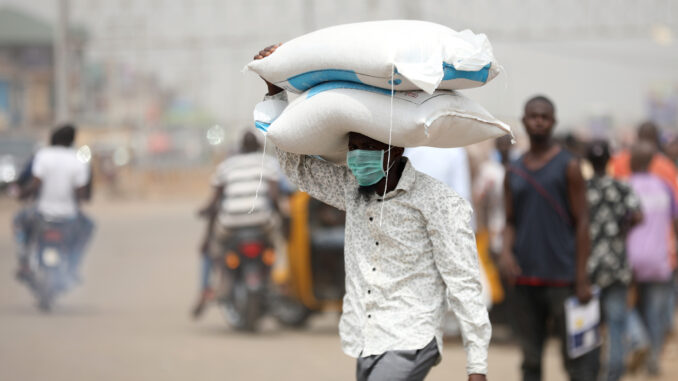
The World Bank projection that more Nigerians will cross over to the poverty bracket is actually begging the issue, given the negative performances of virtually all socio-economic indices presently in the country. The potential impact of COVID-19 on poverty in Nigeria is glaring and it is unfornunate that while COVID-19 is spiking, poverty is equally dealing a blow on Nigerians. Clearly, the scenario poses serious challenge to government which nevertheless has a duty to confront poverty, and also to stem criminality and other potential dislocations that may ensue.
Recently, the World Bank projected that the number of poor Nigerians will increase from the current 90 million to about 100 million by 2022 due to the impact of COVID-19 pandemic on the nation’s economy. This, the multilateral agency attributed to vulnerable employment, reduction in the in-bound remittances and being close to the poverty line.
In addition, due to inflation, the prices of goods and services are rising; while some states are not paying salaries and people are buying food stuff on credit to feed their families. So, poverty in the country also appears man-made, occasioned by mindless corruption and high cost of governance, which has impoverished citizens. In addition, Nigeria, being a developing country currently facing costly debt crises with far-reaching consequences; the window to mitigate the disastrous long-term consequences of COVID-19 on poverty in the country is also closing rapidly.
Obviously, the COVID-19 pandemic and ensuing global economic crisis are on course to reverse Nigeria’s years of gains in the reduction and alleviation of poverty, thus drastically undermining the nation’s efforts to meet the SDG deadline of eradicating extreme poverty by 2030. As a nation, it is important to recognise that the negative consequences of poverty is huge. According to the Sustainable Development Goals Report 2017, countries with higher income inequality suffer from higher levels of insecurity and violence.
The report found that countries with high levels of income inequality had, on average, a homicide rate that was nine times greater than countries where income was more evenly distributed; which could explain increasing crime rate, including suicide, in Nigeria.
These may account for why the 2030 Agenda for Sustainable Development with its 17 Sustainable Development Goals (SDGs), adopted unanimously by world leaders in 2015, recognises that eradicating poverty in all its forms and dimensions, including extreme poverty, is an indispensable requirement for the achievement of inclusive and peaceful societies. As such, action is urgently needed to avoid a fiasco in Nigeria. Having adopted the Agenda, Nigeria should take a multi-dimesnional action that stresses greater engagement in the drive to promote prosperity, human dignity and human rights to end poverty.
This is against the backdrop that Nigeria Poverty Profile, says that poverty goes beyond mere measurement of a household’s expenditure or welfare as it has many dimensions, which include inadequate access to government utilities and services, poor access to health care, growth of unsanitary urban slums and other environmental issues, poor infrastructure, the burden of demand for services and its attendant consequence on school enrolment, illiteracy and ignorance, insecurity that has become a major threat to the agricultural sector with implications for food security, social and political exclusion.
So, achieving poverty reduction requires having the right tools and partnerships for poverty reduction such that everyone has a chance to thrive in a more equitable, prosperous and sustainable country.
As such, the federal and state governments should massively overhaul their current national programmes on social safety nets to reach people living below the poverty line. They should implement far-reaching policies to reduce inequality and promote social and macro-economic resilience, such as tax reforms, the strengthening of labour standards and the expansion of the social protection systems and universal health coverage.
Essentially, for any meaningful economic growth and poverty reduction, there is the need to develop an enhanced welfare model with the ambition and ability to guarantee all inhabitants improved access to social services. Thus, policy makers should look in the direction of bold inequality-reducing and growth-inducing policies such as quality, affordable and accessible health care, public education, housing and other essential services; and address unemployment, especially for young people and those at risk of marginalisation in order to have inclusive growth.
As a long-term measure, the legislatures should prepare an implementable road map with specific, measurable, achievable, realistic and time-bound (SMART) objectives that will span five to ten years, after assessing the state of the manufacturing sector, textile construction industries; and visiting the villages and slums in their constituencies to assess the state of education, health care, roads; level of unemployment, under-employment; and access to land, loans and other factors of production, which are critical to driving growth and creating several new jobs in the non-oil sector such as agriculture, entertainment and telecommunications. All governments, inclusive of federal, states and local governments, must work in synergy for improved outcomes in the nation’s quest to tackle poverty and crime.
END

Be the first to comment